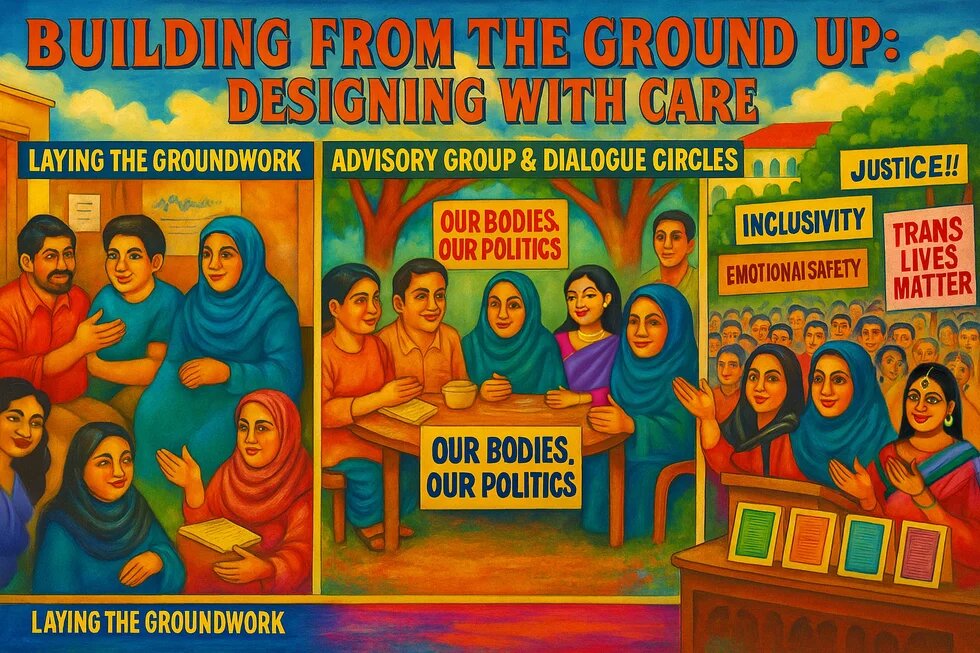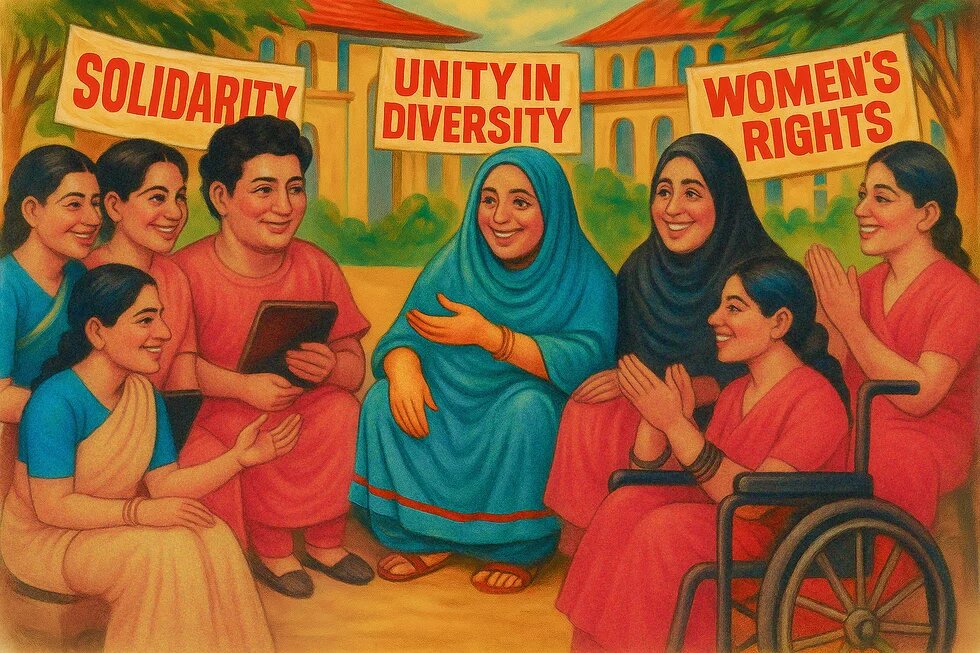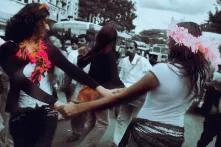
In a powerful experiment, a collaborative initiative in Karnataka brought together sex workers, gender and sexual minorities, Dalit, Muslim, and women with disability to reclaim solidarity through shared stories and collective action.

“The state does not just govern people; it governs their bodies — deciding whose pain matters, whose pleasure is criminal, and whose existence is negotiable.”
This article emerges from a series of rich, reflective conversations held as part of a collaborative initiative led by Solidarity Foundation, with support from Heinrich Böll Stiftung (HBS). The process brought together diverse, marginalised communities across Karnataka to explore lived experiences of bodily control and acts of resistance. Rooted in HBS’s commitment to feminist politics, the initiative placed bodily autonomy at the heart of democratic practice.
We are deeply grateful to the community leaders and partner organisations — Best Practices Foundation, Neeralu Beedi Workers Union, and Karnataka Vikalachetanara Sanghatane — for their trust, energy, and openness in making this journey possible.
This work also builds on the foundation laid by the Alliance of Feminist Collectives, a vibrant network of NGOs and grassroots groups that reaches over 360,000 people across five Indian states. With a strong emphasis on grassroots leadership, the Alliance is committed to co-creating knowledge and strategies to challenge gender-based violence, assert access to entitlements, and amplify the collective voice of marginalised communities in their negotiations with the state.
Fractured Realities, Radical Hope
In a time when divisions seem to define our public life (and even private lives) — whether along lines of caste, religion, gender, ability, or sexuality — moments of true coming together feel rare, almost miraculous. This tendency takes another form within movements and NGOs, where we often find ourselves declaring that “our” cause is the most urgent or singularly vital. In doing so, we risk slipping into cycles of self-promotion, rather than purpose. Social scientist Barry Knight sharply calls these the traps of "egos, logos, silos, and halos." These patterns can undermine solidarity, fragment collective efforts, and blur the deeper transformative goals we set out to achieve.
This is why the recent coming together of disparate individuals and groups in open, honest, and unguarded ways offers a glimmer of hope. In 2024, over the course of several months, something extraordinary unfolded in Karnataka. Female sex workers, gender and sexual minorities, Dalit women, Muslim women, and women with disabilities — groups too often separated by social stigma and systemic marginalisation — chose to meet, listen, and build something together.
Karnataka, shows a mixed performance on Human Development Indices (HDIs). It ranks relatively high among Indian states in terms of overall HDI, driven by robust economic growth, especially in urban centres like Bengaluru. The state has made notable strides in education and health, with increasing literacy rates, improving child health indicators, and better maternal care outcomes. However female literacy rates lag behind (68.13% to 82.85% for men), female labour force participation remains relatively low at around 30%, and issues such as gender-based violence, unequal pay, and limited access to property and decision-making spaces continue to hinder gender equality. The Karnataka's Women's Empowerment Index (WEI) score was 19.03, lower than the national mean, indicating room for improvement in areas like decision-making and gender roles. Moreover, significant disparities persist across regions and social groups, particularly in rural and marginalised communities. Northern districts often lag behind their southern counterparts in access to quality healthcare, education, and employment opportunities.
The Body as Political Battleground, The Body as Resistance
This, coming together was an intentional act of embodied solidarity, rooted not in abstract notions of rights and justice, but in the lived, daily realities of people whose bodies themselves are battlegrounds of control, resistance, and survival. The body is not only the most visible aspect of who we are — it is also central to our sense of self, enabling meaningful personal experience, as pointed out by philosopher Luna Dolezal who has worked on issues around embodiment. Bodies can be understood as both expressions of identity and containers of lived experience, constantly shaped by and responding to the realities they inhabit. In this sense, our bodies are not just physical forms, but carry our identities, hold our memories, and remain in continuous interaction with the realities that we live through. Therefore, these gatherings chose a simple but powerful theme: My Body, My Rights. Through deep dives, difficult dialogues, open discussions, joint workshops and a public convening, participants began to move from isolated struggles to collective strength, crafting a shared language around dignity, autonomy, and empathy. In doing so, they revealed not only the hidden commonalities across their experiences, but also offered the gift of a possible radical blueprint for solidarity in divided times.
Building from the Ground Up: Designing with Care
In line with feminist principles that value intentionality, care, and collective process, we tried to be deliberate and thoughtful in how we designed the lead-up to these dialogues. We knew these conversations would not ‘just happen’, they needed to be nurtured.
The groundwork began with separate conversations with each participating organisation. These weren’t just logistical check-ins; they were vital touchpoints to build trust, answer questions, and co-shape the direction of the initiative. These early conversations helped ensure that everyone felt heard and invested from the start.
To further anchor the process in community wisdom, we formed an advisory group comprising of representatives from the diverse communities involved. Their insights were instrumental in applying feminist values, such as ensuring the space was inclusive, respectful, and emotionally safe, recognising the importance of an intersectional approach whereby people’s multiple realities are factored in, and to ensure that grassroots leaders (rather than NGOs) shape the agenda. Recognising that stories of the body often carry pain, the advisory group also helped us put counselling support in place for anyone who might need it.
We complemented this with a brief literature review to ground our thinking in existing feminist and community-based work on embodiment and resistance. These threads of organisational insights, community wisdom, and theoretical grounding were woven together to inform how the sessions were shaped.
Equally important were our detailed discussions with the facilitator Ms. Vani Periodi. We worked closely to ensure that the sessions would not only meet the goals of the project, but also be responsive to the unique contexts, histories, and sensitivities of each community in the room.
The outputs of these dialogues were myriad. The initial sessions led to the development of five powerful policy briefs documents that captured the most pressing, cross-cutting issues as identified by the communities themselves. These briefs formed the foundation for a public convening with government officials and other stakeholders, and will guide the continued advocacy by community members.
Another key outcome was the creation of a comprehensive facilitator’s manual that is an invitation to other organisations seeking to spark meaningful conversations on body politics and to build solidarity across lines of difference.
Many Voices, Shared Struggles
Much of the language around "body politics" is trapped in academic or policy circles — discussing structures of control, surveillance and resistance in theoretical terms. But for the women and gender-diverse people gathered in Karnataka, the body was not a metaphor. It was the site of daily negotiations with power: seeking to control who can touch you, who gets to decide if you bear children, attempting to counter those who judge your worth based on ability, caste, or religion.
The conversations began with each community separately. Female sex workers, gender and sexual minorities, Dalit women, Muslim women, and women with disabilities each had space to share their specific experiences related to their bodies that were of violence, of joy, of exclusion, of resistance. Many participants said it was the first time they had been invited to speak so openly about their own bodies, issues around power and control, as well as resistance and complex realities.
But the true magic happened when these groups came together. At the joint meeting in September 2024, something shifted. Through careful facilitation, everyday experiences were mapped — and participants saw the striking intersections between their struggles. Sexual harassment, discrimination in education, exclusion from housing, and being forced to hide one’s identity were not limited to one group; they were shared realities, experienced differently but painfully familiar across communities. The participants identified and prioritised their concerns through a collective process, eventually reaching consensus on five key issues they wanted to address: health, housing, education, access to justice, and basic social entitlements-including access to subsidised food grains through the public distribution system. The workshops were facilitated to enable the communities themselves to define the challenges they face and shape the focus of their advocacy.
One participant noted, "I thought many of these deprivations happened only to us. I was amazed to hear about other people’s lives."
This recognition — that difference did not preclude connection, but rather made solidarity richer and more necessary — became the foundation for collective action.
From Listening to Action: Advocacy Reimagined
At the public meeting in November 2024, the spirit of solidarity was further visiblised to a larger audience of around 80 people. This included community members, activists, and some government officials. The leaders came together not to speak as isolated groups, but to present demands across communities.
Each speaker consciously spoke not just about their own group's issues, but about the challenges faced by all. Dalit women advocated for transgender rights. Sex workers raised concerns about the discrimination faced by people with disabilities. Muslim women spoke out against the violence faced by sex workers.
Naming the System, Not Just the Suffering
Rather than merely sharing these stories as personal grievances, participants framed them as systemic failures. They insisted on accountability from a range of actors — government departments, from service providers, and from society itself. In line with the issues being raised, government officials from the relevant departments and bodies such as health, higher education, social welfare, food, civil supplies and consumer affairs, various commissions, and legal service authorities, were invited to the convening.
Across the meetings, participants were brutally honest about the systemic barriers they face. The community representatives prepared and delivered presentations, which centred not on abstract data but on lived experiences and highlighted the real-world barriers and practical difficulties people face in accessing essential services. For example, participants spoke of widespread and deeply entrenched discrimination across key areas of life. In healthcare, Muslim women reported being shamed in hospitals, trans women described humiliation at the hands of doctors, and sex workers and people living with HIV spoke of being routinely denied respectful treatment. In education, Dalit and Muslim children were often relegated to the back of classrooms, while children with disabilities were either denied admission or found schools inaccessible. Housing discrimination was also rampant, with landlords refusing to rent to Muslim women, transgender people, and sex workers or evicting them once their identities became known. Access to justice remained fraught: sex workers were criminalised under anti-trafficking laws, Dalits faced major barriers in getting the police to register their complaints, transgender survivors of violence were ignored by law enforcement, and Muslim women were viewed with suspicion by the very systems meant to protect them.
Their inputs were specific, grounded, and representative of diverse community realities. The collaborative nature of the advocacy, that is bringing together multiple communities with a unified voice, left a strong impression on the participants including the many government officials, as such collective efforts are still relatively uncommon.
Concrete demands were presented, around health, education, housing, social entitlements, and justice. The recommendations put forward ranged from policy-level changes to specific, actionable demands. These included calls to revisit existing policies, — such as ensuring greater portability of entitlements — and broader structural concerns like reviewing medical and school curricula to better reflect the realities of marginalised communities. Participants also stressed the need for sustained sensitisation programmes for healthcare providers, teachers, and other government officials to deepen their understanding of the lived experiences of these groups. Among the proposals were the idea of conducting accessibility audits of all government facilities, establishing women’s clinics at the panchayat level, and setting up one-stop centres staffed by community members themselves to ensure easier access to services delivered with greater empathy and understanding.
Crucially, they called for an intersectional approach — recognising that individuals do not live single-issue lives. A Dalit disabled woman living with HIV, for instance, faces overlapping and compounded barriers that no single-identity approach can fully address.
This coming together was the result of months of deep listening, of painful and courageous sharing, of breaking down the barriers that normally keep struggles compartmentalised.
In an act symbolising this unity, leaders from each group, along with allies, poured water together on a single plant as a way to signal the commitment to nurture the collective future they were building.
Their message was clear: solidarity must not erase difference. It must honour it. True unity can only be built by recognising the distinct challenges each identity faces, and such unity is essential for collectively advocating for the needs of their communities. Coming together in this way not only amplifies the voices of those most marginalised by enabling mutual support, but also fosters deeper understanding of the issues others experience.
Learning by Doing: Flexibility as Feminist Practice
The project was not without its challenges, many of which required us to adapt in real time. One such instance involved our initial one-day meeting with a group of sex workers, which was successful in itself. However, despite our assurances, many participants were unwilling to join the broader convening due to fears of discrimination or being outed as sex workers. In response, we had to repeat the exercise with a different group, highlighting the importance of flexibility and responsiveness to the ground reality.
For participants with disabilities, we arranged private transport, recognising that the public transport system remains largely inaccessible and insensitive to their needs. We also found it necessary to stagger the steps of the process, as our original plan risked overwhelming participants with too much information in a short span. An additional day for preparation was added — something we had not initially accounted for.
These experiences underscored an important lesson: when centering the space, comfort, and safety of community members, it is essential to remain open to change and avoid rigidly following a pre-set plan.
Lessons Beyond Karnataka
In today’s context of rising communalism, casteism, transphobia, and misogyny, this process holds powerful lessons.
First, it shows that solidarity is not automatic. It must be built — carefully, patiently, through difficult conversations and genuine relationship-building.
Second, it affirms that unity does not require erasure of difference. In fact, recognising and valuing difference makes solidarity stronger, not weaker. As one participant said, "Despite our different backgrounds, our pain, our struggles, and our dreams are deeply interconnected."
Third, it reminds us that policy changes and advocacy must be driven by the people most affected and not in a tokenistic way, but through deep, participatory processes where lived realities shape priorities and solutions.
And finally, it offers hope. Even in a landscape scarred by exclusion and hate, people are choosing, against all odds, to come together, to listen deeply, to stand with one another.
This is embodied solidarity: messy, tender, powerful. Rooted not in ideals alone, but in the courageous act of showing up for each other, again and again.
Towards a New Praxis
The Karnataka process is not just an inspiring story; it is a call to action. A range of tools have been developed to sustain and build on this work — including a facilitator’s guide, a series of policy briefs, video recordings from the public meetings, and comprehensive reports from each session. These concrete resources offer a solid foundation to keep the conversations alive and to support ongoing advocacy and engagement.
For activists, it offers strategies for building cross-identity alliances that do not flatten complexity but embrace it. For policymakers, it offers concrete, community-driven recommendations that cut across silos. For donors, it is a clarion call to fund intersectional, inter-movement spaces and spaces that are not just "inclusive" in name, but transformative in practice.
Above all, it is a reminder that reclaiming body politics as grassroots praxis; as everyday acts of resistance, care, and imagination; is not only possible but urgently necessary.
As one participant movingly put it:
"Despite the hardships and challenges in our lives, we experienced kindness, humanity, and shared values in these sessions. May our country be a garden of peace for all."
May we all be moved by this vision.


